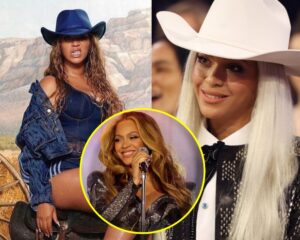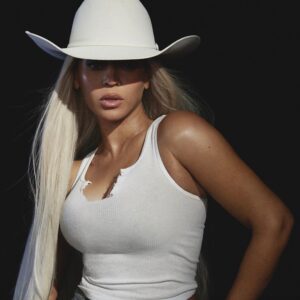“The Grand Ole Opry Imposes Lifetime Ban on Beyoncé, Sparking Debate Over Country Music’s Boundaries”

In a move that has stirred controversy and divided opinions across the music industry, the iconic Grand Ole Opry has announced a lifetime ban on global music icon Beyoncé from performing at its esteemed venue. Situated in Nashville, Tennessee, the Grand Ole Opry has long been revered as a bastion of traditional country music, showcasing legendary performers and upholding the genre’s rich heritage since its establishment in 1925.
The decision to ban Beyoncé has ignited a firestorm of debate, with supporters and critics alike weighing in on the implications for country music’s identity and inclusivity. At the heart of the controversy are remarks reportedly made by Opry officials, who cited Beyoncé’s musical style and image as incompatible with the Opry’s traditional definition of country music.
The ban was reportedly prompted by Beyoncé’s recent exploration of country music with her song “Daddy Lessons,” featured on her critically acclaimed album “Lemonade.” While the track received praise for its genre-bending approach, incorporating elements of country, blues, and hip-hop, it also drew criticism from purists within the country music scene.

Supporters of the ban argue that the Grand Ole Opry has a duty to uphold the integrity of country music and preserve its authenticity. They contend that Beyoncé’s crossover into the genre represents a departure from its traditional roots, potentially diluting its distinctive identity.
Conversely, critics view the ban as a regressive and exclusionary move that perpetuates narrow definitions of country music. They argue that music genres are fluid and should evolve with changing times and cultural influences. Beyoncé’s exploration of country music, they assert, reflects the genre’s ability to transcend boundaries and appeal to diverse audiences.
The controversy surrounding Beyoncé’s ban also raises broader questions about diversity and representation within the country music industry. Historically, country music has faced criticism for its lack of inclusivity and underrepresentation of artists of color. Beyoncé’s ban highlights these ongoing disparities and the challenges faced by minority artists in the genre.

In response to the ban, Beyoncé’s representatives have expressed disappointment, emphasizing the importance of embracing diversity in music. They argue that Beyoncé’s contributions to country music celebrate its rich heritage and showcase its universal appeal.
Critics of the ban point to the evolving landscape of country music, which has seen a resurgence of diverse voices and styles in recent years. Artists like Lil Nas X, Mickey Guyton, and Kane Brown have challenged stereotypes and expanded the genre’s reach, fostering greater inclusivity and artistic experimentation.

The controversy surrounding Beyoncé’s ban underscores the tension between tradition and innovation in the music industry. As genres continue to evolve and artists push creative boundaries, institutions like the Grand Ole Opry face the challenge of balancing historical legacy with contemporary sensibilities.
In conclusion, the Grand Ole Opry’s decision to impose a lifetime ban on Beyoncé has sparked a passionate debate about the nature of country music and the evolving landscape of the music industry. The controversy highlights the need for greater inclusivity and openness within the genre, encouraging a more expansive view of what country music can be in the modern era.
News
Queen Beyonce In A See-through Lace Dress And Cowboy Hat With Her Husband Jay Z Attended The Event
Queen Beyonce In A See-through Lace Dress And Cowboy Hat With Her Husband Jay Z Attended The Event Queen Beyoncé, the legendary singer and global icon, made…
“David Bryan of Bon Jovi Stuns Audience with Unforgettable Surprise Performance”
“David Bryan of Bon Jovi Stuns Audience with Unforgettable Surprise Performance” Bon Jovi keyboardist David Bryan gave an “unforgettable” performance when he spontaneously took over the piano…
Jon Bon Jovi Hits the Town, and Gustavo Dudamel Takes the Stage
Jon Bon Jovi Hits the Town, and Gustavo Dudamel Takes the Stage This week, fans turned out for a new documentary about Jon Bon Jovi and took…
Jon Bon Jovi, 62, on New Documentary: ‘It’s Each of Our Individual Truths’
Jon Bon Jovi, 62, on New Documentary: ‘It’s Each of Our Individual Truths’ New Hulu series addresses Bon Jovi’s voice issues and Richie Sambora’s departure David Bergman/Hulu…
Archiving the Legacy: A Glimpse into Bon Jovi’s Wardrobe Vault( VIDEO)
Archiving the Legacy: A Glimpse into Bon Jovi’s Wardrobe Vault( VIDEO) Step into a room frozen in time, untouched by the passage of years, a sanctuary housing…
Madonna’s Spectacular Concert Set to Ignite Copacabana Beach
Madonna’s Spectacular Concert Set to Ignite Copacabana Beach In less than 20 hours, the eagerly anticipated concert by Madonna, set to draw over 1 million fans, will…
End of content
No more pages to load











